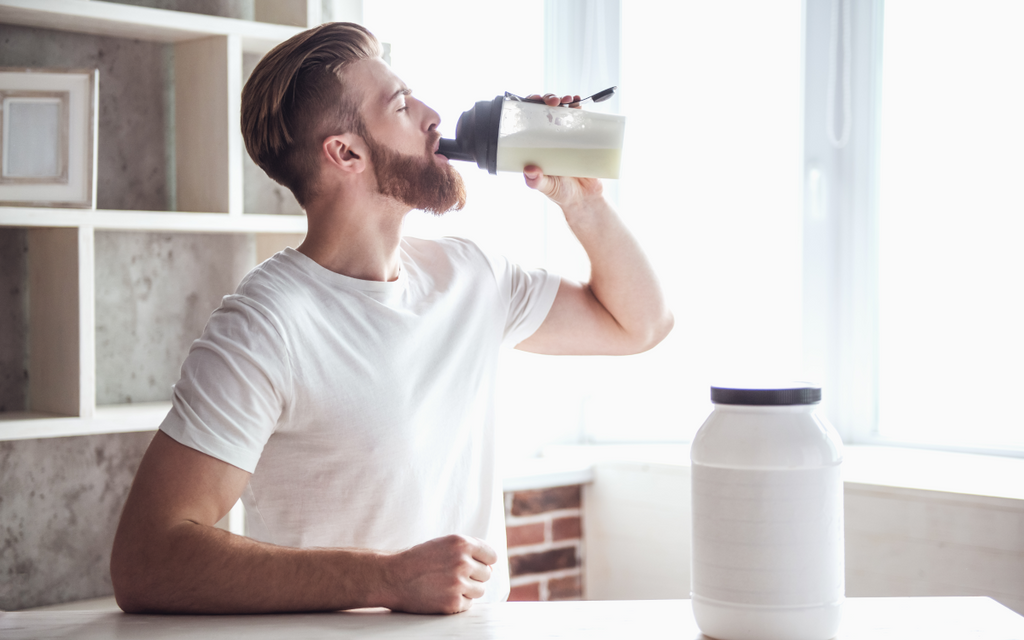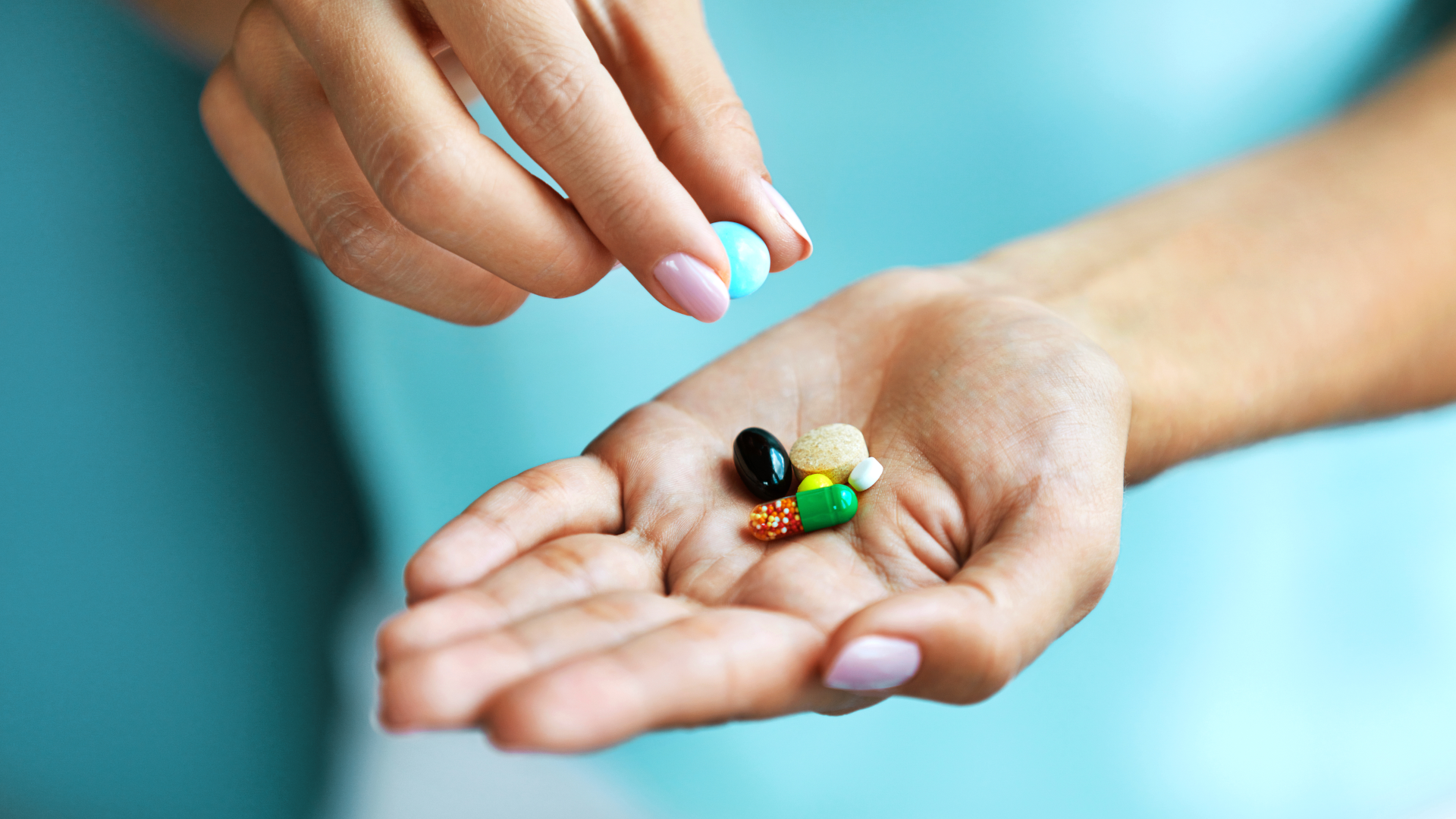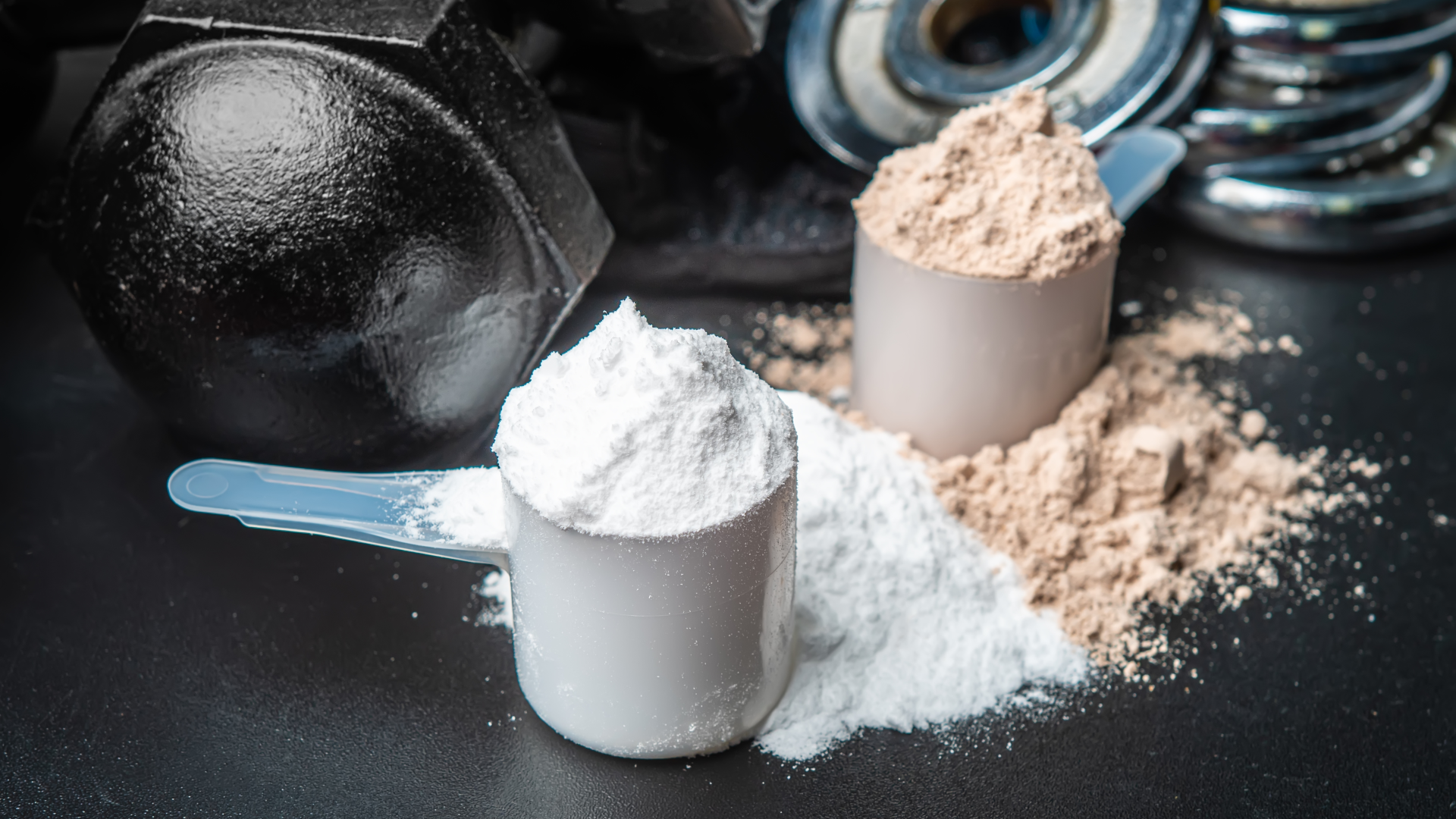Grab your cheat sheet |
Are you looking to maximise your gains with creatine powder? Then you've come to the right place.
Whether you’re a regular creatine supplement user or want to know how to boost your exercise performance, we’ve got you covered.
Taking creatine supplements is a popular practice among athletes and fitness enthusiasts due to its ability to enhance muscle strength, power, and endurance.
If you're curious about how your diet affects your creatine powder results, stay locked in.
Here, we’ll show you how to supercharge your results by weaving the right diet into your fitness routine.
Let’s go.
What is creatine powder?
Creatine powder is a popular dietary supplement that is widely used by athletes and fitness enthusiasts to enhance athletic performance, build muscle, and improve energy levels.
It’s naturally produced in the body and is also found in certain foods such as meat and fish. But, many people opt to take creatine powder as a supplement to ensure they are getting enough to reap its benefits.
What are the benefits of using creatine powder?
Creatine supplementation can enhance anaerobic capacity, empowering gym-goers to sustain high-intensity efforts for longer periods before fatigue sets in.
The supplements can significantly improve strength and power output, making it an excellent choice for athletes participating in explosive sports such as weightlifting or sprinting.
Creatine supplements have been shown to increase muscle mass and improve body composition. This is because it draws water into the muscle cells, leading to increased cell volume and protein synthesis.
Plus, creatine powder can enhance recovery by reducing muscle damage and inflammation, allowing you to train harder and more frequently.
Many people take creatine supplements to build strength, promote brain health and improve endurance performance.
If you're vegetarian or vegan, creatine supplements can help ensure adequate levels of this important compound, as creatine is typically found in animal products.
Here are some of the key benefits of using creatine powder…
Increased Muscle Strength
Creatine supplementation has been shown to increase muscle strength and power output, which can lead to improved performance during resistance training and other high-intensity activities.
Enhanced Muscle Mass
Alongside strength gains, creatine supplementation may promote increases in muscle mass, particularly when combined with resistance training.
This effect is believed to occur through increased water retention in muscle cells and enhanced muscle protein synthesis.
Improved Athletic Performance

Creatine can enhance athletic performance, especially during short-duration, high-intensity activities like sprinting, jumping, and weightlifting.
This improvement allows more rapid energy production during intense bursts of activity.
Faster Recovery
Creatine supplementation may help reduce muscle damage and inflammation following intense exercise, potentially leading to faster recovery times between workouts.
Neuroprotective Effects
Emerging research suggests that creatine may have neuroprotective properties and could benefit cognitive function, particularly in individuals with neurological conditions or during periods of sleep deprivation and fatigue.
Safe and Well-Tolerated
Creatine supplementation is generally safe and well-tolerated when used as directed. It has been extensively studied for its safety profile, with few reported adverse effects in healthy people..
Affordability
Creatine powder is relatively inexpensive compared to many other supplements, making it an accessible option for individuals looking to enhance their exercise performance and muscle growth.
Related: Creatine vs. Whey Protein; which is better?
The role of diet in maximising creatine powder results
While creatine powder can be highly effective on its own, its benefits can be amplified by following the right diet.
Your diet plays a crucial role in providing the necessary nutrients for optimal muscle growth and recovery.
By fueling your body with the right combination of macronutrients and timing your meals appropriately, you can enhance the effectiveness of creatine powder and achieve even better results.
Understanding macronutrients for optimal creatine powder results
To maximise the effects of creatine powder, it's important to understand the role of macronutrients in your diet.
Macronutrients are the three essential nutrients that provide your body with energy: carbohydrates, proteins, and fats. Each macronutrient plays a specific role in supporting muscle growth and recovery.
Carbohydrates are the primary source of energy for your muscles. By consuming an adequate amount of carbohydrates, you ensure that your muscles have enough fuel to perform at their best.
Proteins, on the other hand, are the building blocks of muscle tissue and, in turn, contribute towards muscle mass.
They provide the necessary amino acids for muscle repair and growth. Lastly, fats are essential for hormone production and overall health.
The best foods to include in your creatine powder diet
Now that you understand the importance of macronutrients, let's explore the best foods to include in your creatine powder diet.
When it comes to carbohydrates, go for complex carbohydrates such as whole grains, sweet potatoes, and fruits. These provide a steady release of energy and are packed with essential vitamins and minerals.
For proteins, choose lean sources such as chicken breast, turkey, fish, tofu, and dairy products. These will provide you with the necessary amino acids for muscle repair and growth.
Don't forget to include healthy fats in your diet. Avocados, nuts, seeds, and olive oil are excellent sources of healthy fats that support overall health and hormone production.
Here are some alternative foods you can eat to boost creatine powder results…
Lean Meats: Beef, pork, and poultry are excellent sources of creatine.
Fatty Fish: Salmon, tuna, and mackerel contain creatine.
Eggs: Eggs can contribute to your overall creatine intake.
Dairy Products: Milk, yoghurt, and cheese contain creatine, along with protein and other essential nutrients.

Whole Grains: Adding whole grains such as quinoa, brown rice, oats, and barley into your diet provides complex carbohydrates to support energy levels during workouts. Carbohydrates can also help enhance creatine uptake.
Fruits and Vegetables: Colourful fruits and vegetables are rich in antioxidants, vitamins, and minerals, which support overall health and exercise performance. Plus, some fruits like berries and watermelon may have vasodilatory effects, potentially enhancing blood flow to muscles.
Nuts and Seeds: Nuts and seeds are nutrient-dense sources of healthy fats, protein, and fibre. They can be a convenient snack option to support overall nutrition and energy levels.
Legumes: Beans, lentils, and chickpeas are rich in protein, carbohydrates, and fibre. They provide sustained energy and support muscle recovery and growth.
Beetroot: Beetroot and beetroot juice contain nitrates, which can enhance exercise performance by increasing nitric oxide production and improving blood flow to muscles. This improved blood flow may enhance the delivery of creatine and other nutrients to muscle cells.
Sports Drinks or Fruit Juices: Consuming sports drinks or fruit juices alongside creatine supplementation can provide readily available carbohydrates to spike insulin levels, potentially enhancing creatine uptake by muscle cells.
Meal timing for enhanced creatine powder results
In addition to choosing the right foods, timing your meals properly can further enhance the effectiveness of creatine powder.
Consuming a meal or snack containing carbohydrates and protein within 30 minutes to an hour after your workout can help replenish glycogen stores and kickstart the muscle repair process.
Plus, it's essential to spread out your protein intake throughout the day to ensure a steady supply of amino acids for muscle growth.
Top tip: Aim to consume protein-rich foods in each of your meals and snacks. This will help maximise muscle protein synthesis and promote optimal recovery.
Hydration and its positive impact on creatine powder
Proper hydration is often overlooked but plays a crucial role in maximising the effectiveness of creatine powder.
Creatine draws water into your muscle cells, which can lead to increased cell volume and improved performance. But, if you're not adequately hydrated, the effects of creatine powder may be diminished.
Make sure to drink enough water throughout the day to maintain optimal hydration. Aim for at least eight cups (64 ounces) of water daily—and more if you're engaging in intense exercise or live in a hot climate.
Remember that other beverages, such as tea or coffee, can contribute to your overall fluid intake, but water should be your primary source of hydration.
What are the side effects of creatine powder?
Creatine supplementation is generally safe and well-tolerated for most people when used as directed.
But, some people may experience side effects, especially when taking high doses or in certain situations. Here are some potential side effects of taking creatine powder.
Let’s take a look.
Gastrointestinal distress
Some people may experience gastrointestinal discomforts like bloating, gas, diarrhoea, or stomach cramps, especially when taking high doses of creatine or consuming it on an empty stomach.
Water retention
Creatine supplements can lead to increased water retention in muscle cells, which may cause temporary weight gain or bloating.
This effect is generally mild and temporary but may be of concern to athletes in weight-class sports.
Dehydration
While creatine itself does not cause dehydration, the increased water retention within muscle cells may shift fluid balance in the body.
As mentioned, it's important to drink plenty of water when supplementing with creatine to maintain hydration status.
Muscle cramps

Some individuals may experience muscle cramps or strains, particularly if they are not adequately hydrated or if they engage in intense exercise while supplementing with creatine.
Kidney stress
There have been concerns raised about the potential long-term effects of creatine supplementation on kidney function. However, research has generally shown that creatine supplementation is safe for healthy individuals with normal kidney function. Nonetheless, individuals with pre-existing kidney conditions should exercise caution and consult with a healthcare professional before using creatine.
Liver enzyme elevation
In rare cases, creatine supplements may lead to elevated liver enzymes, though this is typically transient and resolves after discontinuing supplementation.
Allergic reactions
While extremely rare, some individuals may experience allergic reactions to creatine supplementation, such as rash, itching, or difficulty breathing. If you experience any allergic symptoms, discontinue use and seek medical attention.
Interactions with medications
Creatine supplementation may interact with certain medications or supplements, especially those affecting kidney function or electrolyte balance.
If you experience any side effects of creatine, please consult a doctor or healthcare professional.
How does creatine powder work?
Creatine powder works by increasing the amount of creatine phosphate stored in your muscles. During high-intensity exercise, such as weightlifting or sprinting, your muscles need a quick source of energy.
The supplement enhances the energy production system within muscle cells, allowing for greater strength, power, and endurance during high-intensity exercise.
By supplementing with creatine powder, you can increase the amount of creatine phosphate available, which can help to regenerate ATP (adenosine triphosphate), the molecule responsible for providing energy to your muscles.
Note: Individual responses to creatine supplementation may vary, and some individuals may experience more pronounced benefits than others.
Combining creatine powder with other supplements for maximum results
While creatine powder can be highly effective on its own, it can also be combined with other supplements to further enhance your results. One popular combination is creatine powder and beta-alanine.
Beta-alanine is an amino acid that has been shown to increase muscular endurance and reduce fatigue. By combining these two supplements, you can experience even greater improvements in performance.
Other supplements that can complement creatine powder include whey protein, branched-chain amino acids (BCAAs), and glutamine.
These supplements provide additional amino acids to support muscle growth and recovery. But, it's important to note that supplements should never replace a well-balanced diet. They should be used as a complement to your nutrition plan, not as a substitute.
Read: Creatine Pills vs Creatine Powder: What’s the Difference?
What not to do while taking creatine supplements
When taking creatine supplements, it's important to follow recommended guidelines to ensure safety and maximise its muscle-boosting impact.
Here are some things to avoid when taking creatine supplements…
- Exceeding recommended Dosages
- Skipping hydration
- Neglecting your nutritional needs
- Not exercising consistently
- Using Creatine as a shortcut
- Not resting and recovering properly
Level Up Your Gains With CrazyNutrition

Crazy Nutrition’s CRN-5 creatine formula is crafted with five grams of creatine plus electrolytes to help boost energy, support lean muscle mass, and maintain hydration—giving your muscles more strength to push out those last reps you didn’t know you had left in the tank.
FAQs
Does creatine boost muscle strength?
Yes, creatine has been shown to boost muscle strength. Creatine supplements can be an effective strategy for increasing muscle mass and power, particularly when partaking in activities that require short bursts of maximal effort.
Does creatine work for women?
Yes, creatine supplements can work for women just as it does for men. While creatine has often been associated with male athletes and bodybuilders, research indicates that women can also benefit from creatine supplementation, particularly in terms of improving exercise performance, increasing muscle strength, and enhancing lean body mass.
How much creatine is safe for my kidneys?
Creatine supplements are generally considered safe for healthy individuals, including the kidneys, when used as directed and within recommended dosages.
But there have been concerns raised about the potential long-term effects of creatine supplementation on kidney function, particularly in individuals with pre-existing kidney conditions.
What is the most common type of creatine supplement?
The most common type of creatine supplement is creatine monohydrate. Creatine monohydrate is the original and most extensively studied form of creatine, and it remains the most popular choice due to its effectiveness, affordability, and extensive research backing its benefits
While creatine monohydrate supplementation is the most common and widely used form of creatine, there are other variations available, including micronized creatine, creatine ethyl ester, creatine hydrochloride, and buffered creatine.



